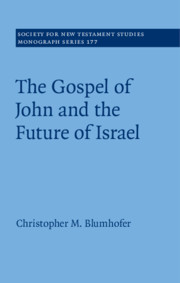Book contents
- The Gospel of John and the Future of Israel
- Society for New Testament Studies
- The Gospel of John and the Future of Israel
- Copyright page
- Dedication
- Contents
- Acknowledgments
- 1 Introduction
- 2 Announcement: John 1–4
- 3 Debate: John 5–10
- 4 Crisis: John 11–20
- 5 Conclusion: Implications for the Interpretation of John
- Select Bibliography
- Index
1 - Introduction
Published online by Cambridge University Press: 16 January 2020
- The Gospel of John and the Future of Israel
- Society for New Testament Studies
- The Gospel of John and the Future of Israel
- Copyright page
- Dedication
- Contents
- Acknowledgments
- 1 Introduction
- 2 Announcement: John 1–4
- 3 Debate: John 5–10
- 4 Crisis: John 11–20
- 5 Conclusion: Implications for the Interpretation of John
- Select Bibliography
- Index
Summary
Nearly a century ago, Rudolf Bultmann described two basic problems that beset the study of the Fourth Gospel: (1) the place of the Gospel in the development of early Christianity and (2) its central idea.1 Simply put, from what conceptual, social, and historical situation does the Gospel of John emerge? And how can we characterize the central theological claim of the Gospel? Whether stated or not, these two questions – the historical and the theological – and their corresponding answers are bound up with all exegesis of John.2 The present study will propose an approach to the Fourth Gospel that sheds light on both problems: The Gospel of John ought to be read as a narrative argument about how Israel might embrace its future. The Gospel consistently demonstrates how Israel’s worship of God and obedience to God find their fulfillment through Jesus Christ. John’s concern for the future of Israel means that it is incorrect to view John as interested in replacing or superseding Judaism. It is incorrect to read John as a document that looks back on a decisive break with Judaism. Rather, John seeks to demonstrate the fundamental continuity that runs toward Jesus through the Scripture and history of Israel, and through the practices and convictions of first-century Judaism. John claims that this Scripture and history, those practices and convictions, find their home in Jesus and the people who believe in him. Nearly half a century ago, Nils Dahl called this a “peculiar” continuity.3 He was surely right, about both the continuity and its peculiarity. Be that as it may, the Gospel of John presents its reader with a theological vision for the way in which Israel might move into its future in continuity with its past. Reading the Gospel from this perspective sheds light on the historical context of the Gospel and its theological center.4
- Type
- Chapter
- Information
- The Gospel of John and the Future of Israel , pp. 1 - 47Publisher: Cambridge University PressPrint publication year: 2019

